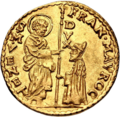Tarì



Tarì (from Arabic طري ṭarī, lit. "fresh" or "newly minted money")[1] was the Christian designation of a type of gold coin of Islamic origin minted in Sicily, Malta and Southern Italy from about 913 to the 13th century.[2]
History
In the Islamic world, this type of coin was designated under the name ruba'i, or quarter-dinar, as it weighed 1.05 g (0.034 ozt) of gold.[1] The ruba'i had been minted by the Muslims in Sicily, unlike the Muslim rulers of North Africa, who preferred the larger dinar.[3] It became highly popular as it was smaller and therefore more convenient than the large-sized 4.25 g (0.137 ozt) dinar.[4]
The tarì were so widespread that imitations were made in Southern Italy (Amalfi and Salerno) from the mid-tenth century, which only used illegible "pseudo-Kufic" imitations of Arabic.[1][4][3] When the Normans invaded Sicily in the 11th century, they issued tarì coins bearing legends in Arabic and Latin.[5] Roger II of Sicily issued such coins, becoming the only Western ruler at that time to mint gold coins. Their composition was 161⁄3 carat gold (0.681 fineness) with some adjunction of silver and copper.[3] The tarì were also produced by the Hohenstaufens and the early Angevins.[6]
The tarì coins were generally minted from African gold obtained from Misrata or Tunis in Northern Africa in exchange for grain.[6]
Nowadays, the tari is a subunit (1/12) of the scudo, souvenir coins issued by the Sovereign Military Order of Malta.
See also
References
Citations
Works cited
- Blanchard, Ian. Mining, Metallurgy and Minting in the Middle Ages. Franz Steiner Verlag, 2001. ISBN 978-3-515-07958-7 Mining, Metallurgy and Minting in the Middle Ages: Asiatic supremacy, 425-1125
- Cardini, Franco. Europe and Islam. Blackwell Publishing, 2001. ISBN 978-0-631-22637-6 Europe and Islam
- Grierson, Philip. Medieval European Coinage. Cambridge University Press, 1998. ISBN 978-0-521-58231-5 Medieval European Coinage: Volume 14, South Italy, Sicily, Sardinia: With a Catalogue of the Coins in the Fitzwilliam Museum, Cambridge
- Matthew, Donald, The Norman kingdom of Sicily Cambridge University Press, 1992 ISBN 978-0-521-26911-7 The Norman Kingdom of Sicily
External links
![]() Media related to Tarì at Wikimedia Commons
Media related to Tarì at Wikimedia Commons

